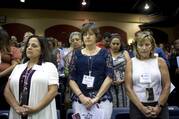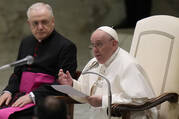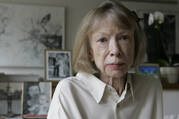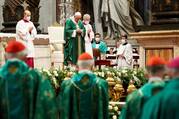Loading...
Click here if you don’t see subscription options
Click here if you don’t see subscription options

FaithNews
The “Faith Manifesto,” signed by around 6,000 people, sharply criticizes the demands of the Synodal Path, which amount to a “self-secularization of the church,” Bernhard Meuser said.

FaithShort Take
We have learned a lot about sexual abuse by Catholic clergy since The Boston Globe unveiled its investigation in 2002, writes an expert in child protection. That is bringing us closer to the goal of seeing no new cases.

Politics & SocietyPodcasts
Robert Pape, a political scientist at the University of Chicago, talks with Gloria Purvis about how the people who stormed the U.S. Capitol on Jan. 6 are not as different from ordinary Americans as you might think.

Politics & SocietyNews
For the first time, a layman and a nun provided the English and Spanish translations of Francis’ weekly catechism lesson rather than a cloaked monsignor, a small but revolutionary change for the Vatican.

FaithSpeeches
“It is a risk, yes: having a child is always a risk, either naturally or by adoption,” Pope Francis said. ”But it is riskier not to have them.”

Arts & CultureCatholic Book Club
Joan Didion was capable both of conjuring up the horrors of modern life and of offering solace that there was still a point to it all.

Politics & SocietyShort Take
The temptation is to fight the ghosts of Modernism by denigrating those working for social justice and “elites” as anti-religious co-conspirators. But this would be a disservice to the truth and to the church.

Politics & SocietyNews
In mid-January, a law firm is scheduled to publish a report into the handling of clerical sexual abuse in the Archdiocese of Munich and Freising, where Pope Benedict XVI was archbishop.

Politics & SocietyDispatches
“All the prices are ridiculously high,” said Manuel Jeremías Ake, a father of six in California. “We were struggling to buy what we could afford. But now, forget about it. I’ve never seen anything like this in this country.”

FaithFaith and Reason
A synod on synodality is a process about a process. And that stuck with me. A process about a process seemed to be without content. Where would this lead us?
